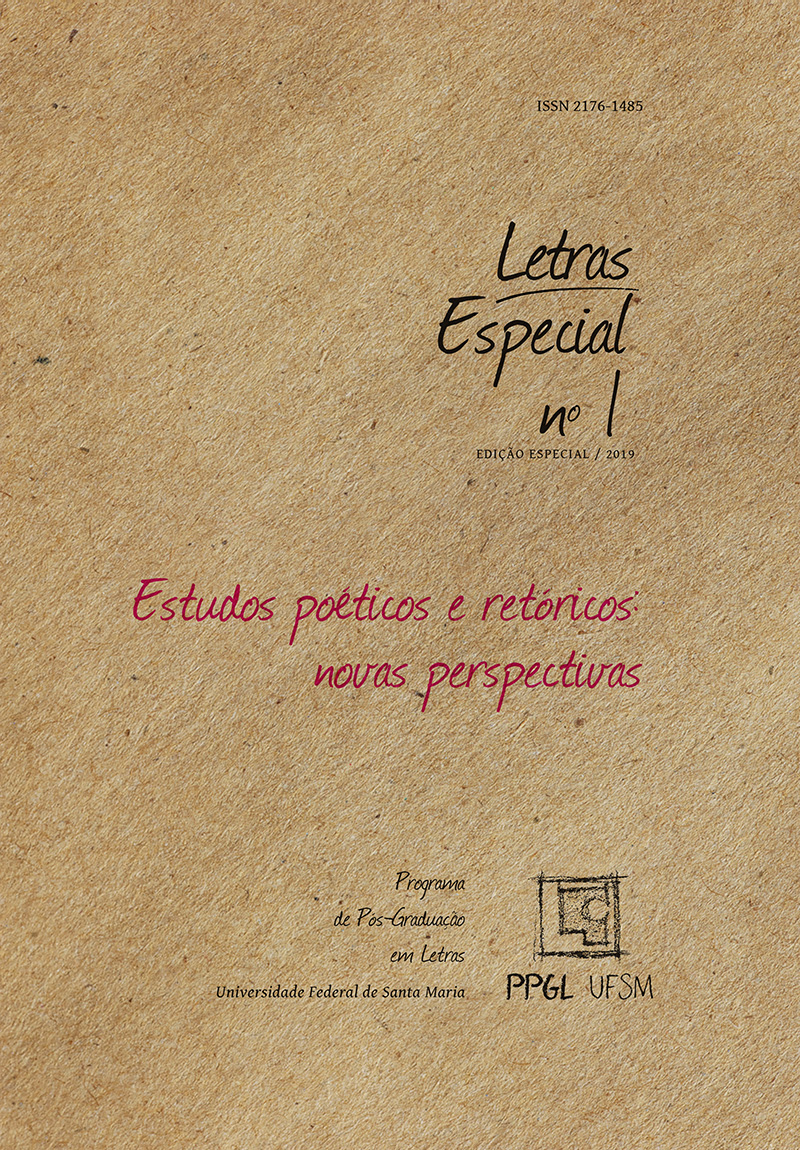“A Visão Imaginária de Minha Alma”: a poética renascentista e a noção de imaginação
DOI:
https://doi.org/10.5902/2176148538048Palavras-chave:
Imaginação, Poética renascentista, PhantasiaResumo
Nos séculos XVI e XVII, o significado conceitual de “imaginação” atrelava-se sobretudo à teoria aristotélica da phantasia, traduzida como imaginatio, em latim, e amplamente discutida em tratados sobre poesia e retórica. Neste artigo, propõe-se explorar brevemente algumas ideias relativas à especificidade histórica da noção de “imaginação” na poética renascentista, com vistas a evitar as abordagens transistóricas da poesia e de sua interpretação. Para tanto, serão comentados trechos específicos dos tratados The Defense of Poetry (1595), de Philip Sidney, Advancement of Learning (1605), de Francis Bacon, bem como algumas passagens das obras de William Shakespeare.
Downloads
Referências
ARISTOTLE. De anima. Ed. and Tr. by W. D. Ross. Oxford: Clarendon, 1984.
ARISTOTLE. Poetics. Ed. and Tr. by S. Halliwell. Harvard: Harvard U.P., 1995.
BACON, Francis. The Advancement of Learning. Auckland: The Floating Press, 2010.
BALDWIN, T.W. William Shakspere's Small Latine & Lesse Greeke. Illinois: University of Illinois Press, 1944.
BATE, Jonathan. Shakespeare and the English Romantic Imagination. Oxford: Clarendon, 1989.
BUNDY, Murray W. “Invention” and “imagination”. Renaissance Journal of English and German Philology, Illinois, v.29, n. 4, pp. 535-545, 1930.
COLERIDGE, Samuel Taylor. "Chapter 13 [Imagination] of Biographia Literaria". In: MELLOR, Anne K; MATLAK, Richard E. (ed.) British Literature 1780-1830. Harcourt Publishers, 1996.
ENGELL, James. The Creative Imagination: Enlightenment to Romanticism. Cambridge, Mass., and London: Harvard UP., 1981.
HANSEN, João Adolfo. A sátira e o engenho: Gregório de Matos e a Bahia do século XVII. 2 ed. São Paulo: Ateliê e Unicamp, 2004.
HANSEN. Alegoria: construção e interpretação da metáfora. São Paulo: Hedra, 2006.
KEATS, John. The Letters of John Keats. Cambridge: Cambridge U.P., 2011.
KESSLER, Eckhard. “The Intellective Soul”. In: SCHMITT, Charles; SKINNER, Quentin (ed.). The Cambridge History of Renaissance Philosophy. Cambridge: Cambridge U.P., 1990, pp. 485-534.
KLEIN, Jürgen. “Genius, ingenium, imagination: aesthetic theories of production from the Renaissance to Romanticism”. In: BURWICK, Frederick and KLEIN, Jürgen (Eds.). The Romantic Imagination. Amsterdam: Rodopi, 1996.
MACK, Peter. A History of Renaissance Rhetoric, 1380-1620. Oxford: Oxford U.P., 2011.
PARK, Katherine. “The Organic Soul” In: SCHMITT, Charles; SKINNER, Quentin (ed.). The Cambridge History of Renaissance Philosophy. Cambridge: Cambridge U.P., 1990, pp. 464-484.
SHAKESPEARE, William. “A Midsummer Night’s Dream”. In: SHAKESPEARE, William. The Complete Works. New York: Gramercy, 1975.
SIDNEY, Phillip. Sir Philip Sidney - The Major Works. Ed. Katherine Duncan-Jones. Oxford: Oxford World’s Classics, 2002.
SILVARES, Lavinia. Nenhum homem é uma ilha: John Donne e a poética da agudeza. São Paulo: Editora UNIFESP, 2015.
SILVARES, Lavinia. “Guerra de Olhares: Emulação e agudeza em Vênus e Adônis (1593), de William Shakespeare”. Matraga. Rio de Janeiro, v. 20, n. 3, pp. 47-69.
VICKERS, Brian. “Rhetoric and Poetics”. In: SCHMITT, Charles; SKINNER, Quentin (ed.). The Cambridge History of Renaissance Philosophy. Cambridge: Cambridge U.P., 1990, pp. 715-745.
VICKERS, Brian. English Renaissance Literary Criticism. Oxford: Oxford U.P., 2003.
WORDSWORTH, William. “Preface”. In: WORDSWORTH, William. Lyrical Ballads and Other Poems. London: Wordsworth Poetry Library, 2003.
YATES, Frances. The Art of Memory. London and New York: Routledge, 1966.
Downloads
Publicado
Como Citar
Edição
Seção
Licença
Copyright (c) 2019 Letras

Este trabalho está licenciado sob uma licença Creative Commons Attribution-NonCommercial-ShareAlike 4.0 International License.
Ficam concedidos a Letras todos os direitos autorais referentes aos trabalhos publicados. Os originais não devem ter sido publicados ou submetidos simultaneamente a outro periódico e não serão devolvidos. Em virtude de aparecerem nesta revista de acesso público, os artigos são de uso gratuito, com atribuições próprias, em aplicações educacionais e não comerciais.






